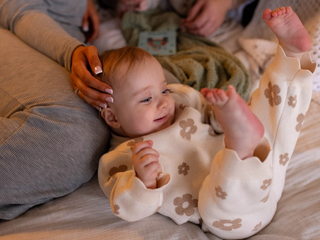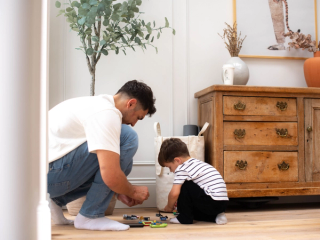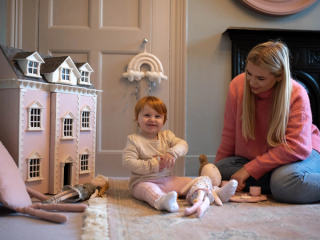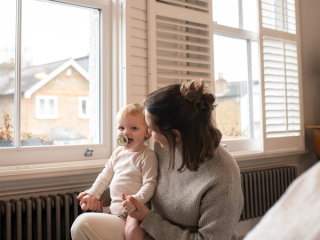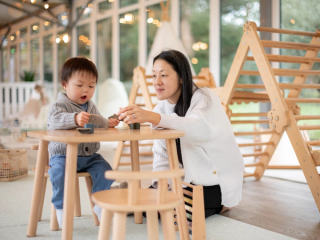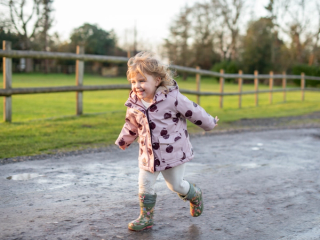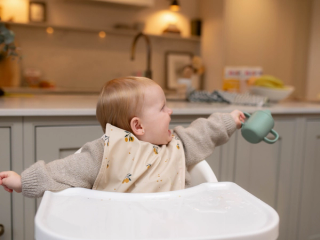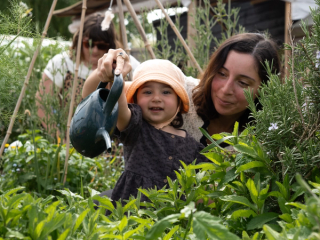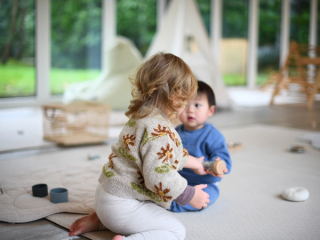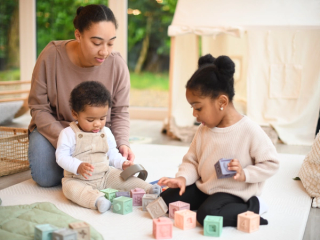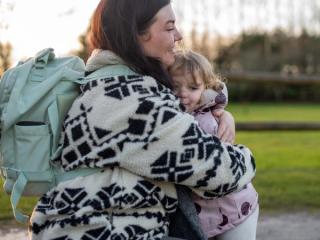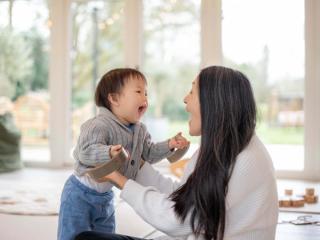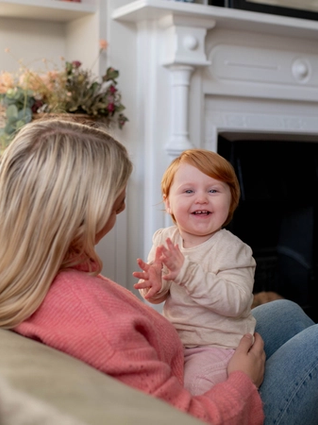
- Home
- Advice Hub
- Toddler
- Toddler Milestones
- How To Model Good Social Behaviour
How to model good social behaviour
Discover how to support your toddler's social development between 12–18 months with positive role modelling, consistent boundaries, and playful learning.
The first sentence I’m going to write, I’m sure, will come as no surprise to you at all…at 12-18 months your toddler believes they are the centre of the world! And yes they will always be the centre of our world, but because they truly believe they are the centre of THE world they will constantly crave attention from you and watch your reaction to their behaviour (both positively and negatively).
Exploring social interactions
Your toddler will try to interact with both adults and children, family, friends, and even strangers - testing out behaviours to see what happens – essentially learning the cause and effect of different social skills. They may try to make you laugh or smile, they may try and show affection through a cuddle, but they may also snatch, be very stubborn and push other children. It’s really important from an early age that we give lots of praise for positive behaviours your toddler does as you don’t want them to learn that they only get a reaction or attention when they do something they shouldn’t such as pushing another child or throwing toys around the room.
Praising positive behaviour
It’s important to introduce your child to the whole range of emotions, as they learn from you, you can explain and label your own emotions or emotions of characters in stories or books. “George pig is sad because he lost his dinosaur.” Point to George’s face and display this emotion on your face too, it all helps your child to make links in their brain which form new learning of social behaviours.
Alongside praise, we need to model good behaviour ourselves. At 12–18 months, your toddler’s brain is rapidly developing and absorbing the world around them. What they see you do has the biggest impact. Start small—encourage manners like saying “please” and “thank you,” and model positive social behaviour in real-life settings.
Boundaries and routines
Having firm but fair boundaries and routines are the foundations required to help your toddler with their social behaviours. Children need predictable parenting, they need to feel safe and secure, they need to know that (generally) the consequence of their actions around you will result in the same outcome. They need you to be the stability that guides them and by having key routines and boundaries in place we are able to provide this.
Some children may need additional support in developing an understanding of good social behaviour, and actually as adults we can over complicate sentences and use too many words to get one simple point across! For example, if I wanted a child to pass me a pencil, I would probably naturally say “Please can you pass me the pencil that’s next to you?” but really, we need very few words, we can strip it right back to a non-verbal cue (pointing to the pencil), saying the word pencil and gesturing for the child to give it to you. So when we talk about being a positive role model for your child, it’s not just what you say, it’s what you do. The old age saying – actions speak louder than words – is very true when it comes to communicating, modelling and demonstrating good social behaviours to our toddlers.
The power of play
As your child gets older you can start to prepare them in advance for new social situations, talk to them, explain where you’re going, what will happen, who will be there, what they can do, what they can’t do and rehearse and practise social situations through play together.
Play is not something that comes easy to many adults, perhaps we are so distracted by all the other things on our to do list, or no one ever got down on the floor to play with us as children, but the impact of play on developing our children’s social skills and behaviour is paramount. There are ideas which cover personal, social and emotional development in the MMT play cards which you can access a discount as a BabyClub member here.
Balancing praise and correction
It can be tricky, to understand when to pick up on bad behaviour and when to praise and I know that sometimes we can feel like we are falling into a trap of saying ‘don’t’ and ‘no’ too often, or equally letting our toddlers get away with things they shouldn’t as we try not to be too authoritarian, or quite simply we are over stimulated ourselves, tired and drowning in the demands of life, work and commitments!
But it really is so important that we get this balance right in order to model good social behaviour. If we frequently tell a toddler or young child not do something it can make them feel that the world is a negative place and that nothing is allowed, they can become disengaged and engagement and exploration are key for learning! Therefore, alongside what they can’t do, we also need to teach them what they can do. I like to offer choices and divert negative social behaviours by providing the toddler a choice.
For example, “No, we can’t throw books across the room because they will get damaged and you might hurt someone. But you can throw the cushions or some soft blocks.” Then I would visually show both the cushions and the soft blocks and encourage or prompt the child to point and select one. I would then model how we could make a fun game by throwing the cushions then running to get them and bring them back. It’s always really important to be mindful that a behaviour a young child might be displaying could actually be a schema, which is part of how they play and learn. For example, throwing toys is part of the trajectory play schema, so allowing the child to still explore within the schema, but in a safe way is key.
Your toddler is never too young to learn good social behaviours from you, the world around them, the games you play together and the experiences you have together. In fact, they are learning these all the time, so be the best role model you can be and provide consistent boundaries to best support your toddler with this.
